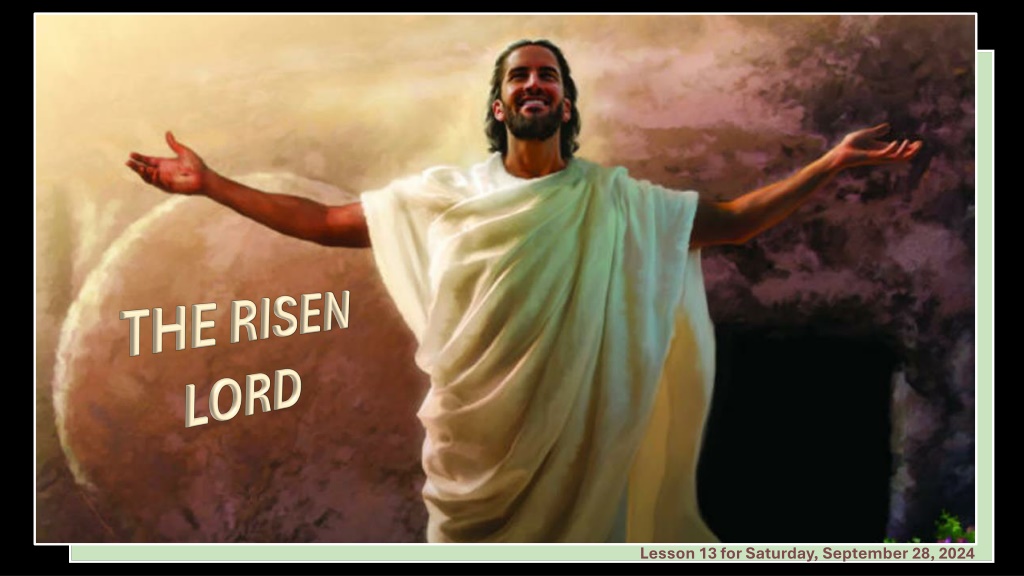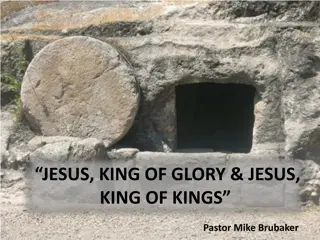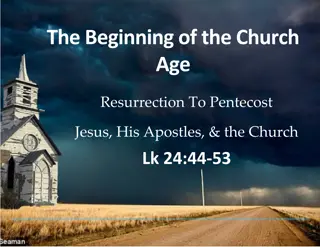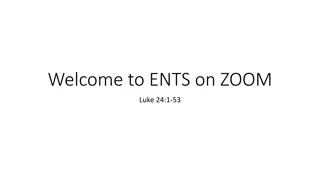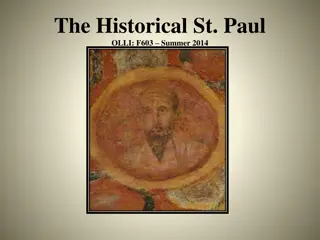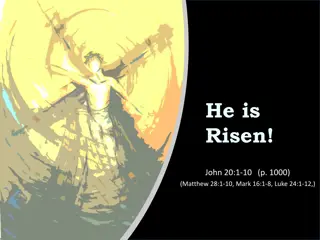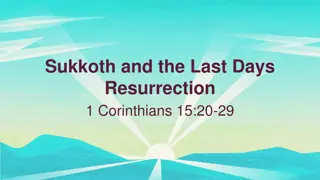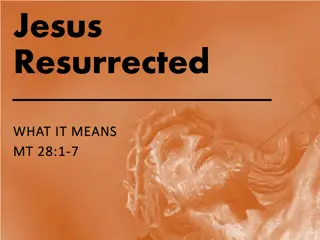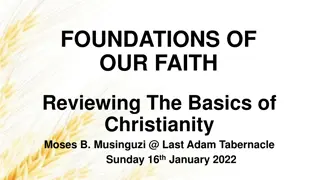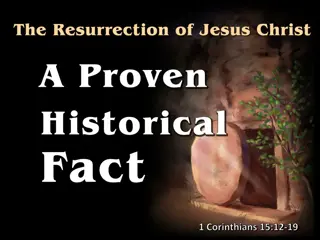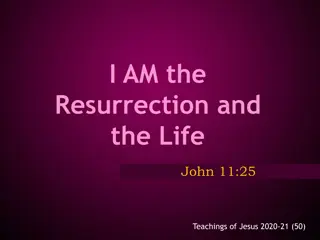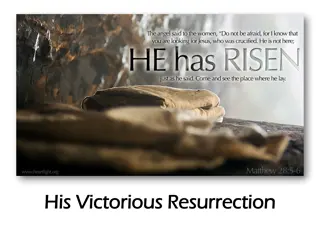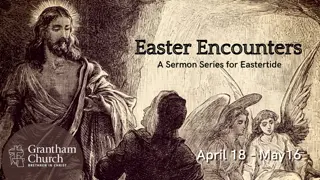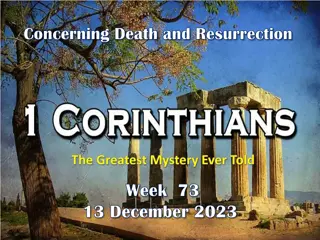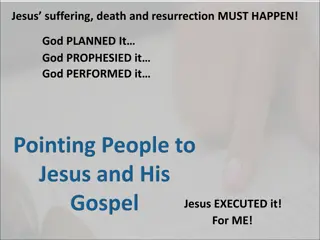The Resurrection of Jesus: A Momentous Event
The resurrection of Jesus is portrayed through the accounts of the evangelists, highlighting the disbelief of the disciples and the eventual acceptance of this miraculous event. The chronology and memorial of this significant occurrence are discussed, emphasizing the realness of Jesus' resurrection with multiple witnesses and impactful life transformations. The first witnesses, the changes in Saul, and the existence of the Christian church all serve as testaments to the authenticity of Jesus' resurrection.
Download Presentation

Please find below an Image/Link to download the presentation.
The content on the website is provided AS IS for your information and personal use only. It may not be sold, licensed, or shared on other websites without obtaining consent from the author.If you encounter any issues during the download, it is possible that the publisher has removed the file from their server.
You are allowed to download the files provided on this website for personal or commercial use, subject to the condition that they are used lawfully. All files are the property of their respective owners.
The content on the website is provided AS IS for your information and personal use only. It may not be sold, licensed, or shared on other websites without obtaining consent from the author.
E N D
Presentation Transcript
Jesus of Nazarene [] has risen (Mark 16:6). With these words, the angels were the first to proclaim the great miracle of the resurrection. The four evangelists give different details that help us understand the events that occurred on the morning of the resurrection. But they all agree on something: the women believe, the disciples doubt. After much evidence, everyone believes. Then, they are commissioned by Jesus to proclaim the news to the entire world. This order is still in force today: let us announce that Jesus was resurrected and gives eternal life to everyone who believes in Him! Mark 16:1-8. The resurrection of Jesus: Chronology and memorial. A real fact. Bearers of good news. Mark 16:9-20. Witnesses of the resurrection: The first witnesses. A story to spread.
CHRONOLOGY AND MEMORIAL And very early in the morning the first day of the week, they came unto the sepulchre at the rising of the sun (Mark 16:2) Jesus had announced that, after his death, he would rise again on the third day (Mark 10:34). Jesus died on the day called the preparation (that is, the day before the Sabbath) and was resurrected on the first day of the week, after the Sabbath (Mark 15:42; 16:1-2). The Jews called the days of the week first (Sunday), second (Monday), , preparation (Friday) and Saturday. Furthermore, they had an inclusive method of counting [a part of the day was counted as the whole day]. In this way, Friday was the first day of Jesus' death; Saturday the second day; and Sunday the third day. Beginning in the 2nd century, Christians began to honor the first day of the week as the day of the Lord's resurrection. Gradually, they made it a day that replaced Saturday as a day of worship. But in the New Testament there is no reference to the day of resurrection as a day of worship. Paul makes it clear that the memorial of death and resurrection (its symbolic meaning) is baptism (Col. 2:12; Rom. 6:4).
A REAL FACT How can we be sure that Jesus' resurrection was a real event? Many witnesses saw Jesus resurrected (1Co. 15:3-8) The priests had to bribe the soldiers who witnessed the resurrection (Mt. 28:11-15) The people who experienced the events were willing to die defending the reality of the resurrection (Acts 7:56-60) Saul, a staunch enemy of Christians, saw the resurrected Jesus and his life changed radically (Acts 9:1-6) The very existence of the Christian church attests to the reality of the resurrection.
The first to see the empty tomb were some women who came to embalm Jesus' body (Mark 16:1-4). After assuring them that Jesus had risen, the angel who had remained at the tomb commissioned them to announce the event to his disciples and to Peter (Mark 16:7). With the excitement of the events, they returned scared, without commenting anything to anyone (Mark 16:8). On the way, Jesus himself appeared before them and encouraged them to speak without fear of his resurrection (Mt. 28:8-10). The life, death and resurrection of Jesus are not events that should be silenced. Jesus' command was: Go ye into all the world, and preach the gospel to every creature (Mark 16:15). Like the women and the disciples, we must go out and preach this good news everywhere (Mark 16:20).
THE FIRST WITNESSES Now when Jesus was risen early the first day of the week, he appeared first to Mary Magdalene, out of whom he had cast seven devils (Mark 16:9) By uniting the four gospels, we can get an idea of what happened that Sunday: An angel causes an earthquake and opens the tomb (Mt. 28:2) The guards remain as dead (Mt. 28:4) Mary Magdalene goes to the tomb from Bethany (Jn . 20:1) Other women come from Jerusalem and talk to the angels (Luke 24:1-5) The women return to Jerusalem (Mark 16:8) At Mary's announcement, Peter and John run to the tomb (Jn . 20:2-3) Jesus appears to Mary Magdalene (Mark 16:9) Jesus appears to the rest of the women (Mt. 28:9) The disciples do not believe (Mark 16:11) Soldiers are bribed (Mt. 28:11-13) Jesus appears to Peter (Luke 24:34) Jesus travels to Emmaus (Luke 24:13-15) The disciples of Emmaus go to the upper room (Mark 16:12-13) Jesus appears in the upper room (Mark 16:14) The resurrection of Jesus was real. If the story were fictional, would the authors have highlighted the faith of the women and the disbelief of the disciples?
Jesus commissioned his followers to go into all the world to preach (Mark 16:15). Why is this extremely important? Acceptance or rejection of the gospel is a matter of eternal life or death (Mark 16:16). We cannot allow anyone to die in ignorance. We must tell them about the Savior. A special power accompanies the preachers of the gospel (Mark 16:17-18). However, sometimes God allows the seed of the gospel to be planted with the blood and suffering of the messengers (Acts 7:58). One thing we must be clear about: Jesus does not ask us to do this work alone. He promises his presence and power (Mt. 28:18-20). Just as He helped the first disciples, He will help us to finish the work (Mark 16:20).
We have a living Saviour. He is not in Joseph's new tomb; He is risen from the dead and has ascended on high as a Substitute and Surety for every believing soul. Therefore being justified by faith, we have peace with God through our Lord Jesus Christ (Romans 5:1). The sinner is justified through the merits of Jesus, and this is God's acknowledgment of the perfection of the ransom paid for man. That Christ was obedient even unto the death of the cross is a pledge of the repenting sinner's acceptance with the Father. Then shall we permit ourselves to have a vacillating experience of doubting and believing, believing and doubting? Jesus is the pledge of our acceptance with God. We stand in favor before God, not because of any merit in ourselves, but because of our faith in the Lord our righteousness. EGW (Faith and Works, pg. 107)
